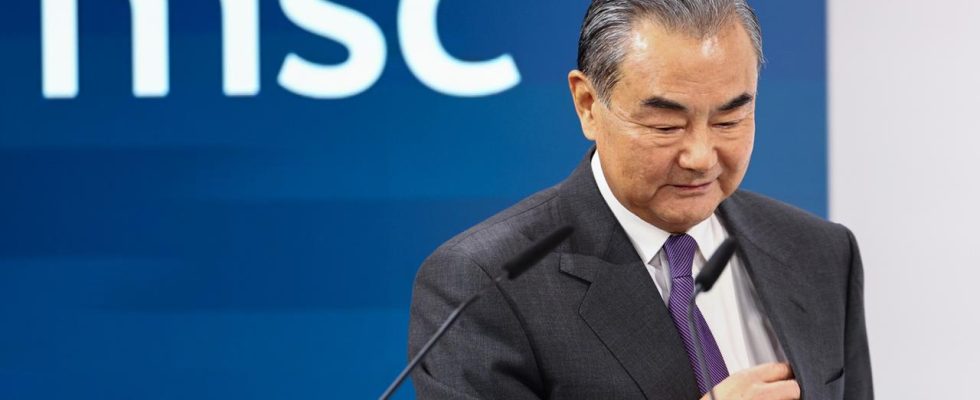The Chinese Foreign Minister presented his country as a peacemaking force at the Munich Security Conference: If China and the USA worked together, great things could be achieved. What’s behind it?
On the sidelines of the security conference, China’s Foreign Minister Wang Yi held talks behind closed doors with his US counterpart Antony Blinken and also with Federal Foreign Minister Annalena Baerbock. On the open stage, Wang presented his country as peace-loving:
We have kept our commitment and made it clear that China will not use nuclear weapons against states that do not have them and will not carry out a first strike of this kind against any country, including Ukraine. President Xi has made it clear that nuclear war must not break out and nuclear weapons must not be used.
In Brussels, the EU Commission takes this position very seriously. European politicians, on the other hand, put a big question mark behind other assurances of Chinese neutrality. Wang emphasized that China wanted to pave the way for a mediation solution in the Ukraine conflict and was committed to peace.
Close relationship with Russia
Last year, Wang made headlines when he announced a position paper on the Ukraine conflict at the security conference, which many interpreted as a peace plan. A premature hope, as became apparent in the months following the conference. Presidents Volodymyr Zelenskyj and Xi Jinping spoke to each other, but no concrete steps towards peace followed. Rather, Xi repeatedly reaffirmed his close relationship with Putin.
This goes very far, says the foreign policy chairman of the CDU/CSU parliamentary group Roderich Kiesewetter:
We should be aware that China is in close alliance with Russia, Iran and North Korea. This is a burden-sharing system in which China acts as an appeaser externally, but internally supplies Russia with all the necessary semiconductors and chips – and at the same time benefits from Russian mineral resources. North Korea helps ship ammunition to Russia.
In addition, the People’s Republic has been massively upgrading for years – and also technologically. How far along it is with the military use of artificial intelligence is unclear, says Kiesewetter. The Chinese Navy provides it.
No sign of collaboration
Anton Hofreiter from the Green Party feels the same way: “If you look at the speed at which the Chinese navy is upgrading, including in terms of the number of anti-ship missiles, then it will only be a few years before the situation becomes significantly more problematic .”
The resource-rich South China Sea is already the scene of demonstrations of power: Beijing is gradually claiming space there for itself, and American and Chinese warships are coming dangerously close to one another. So far there is no sign of cooperation between the two rival great powers, as Wang propagated in Munich.
Can things happen in Taiwan like in Ukraine?
Then there is Taiwan – the People’s Republic wants to annex the democratically governed island off its coast by force in extreme cases. In Munich, Wang Yi repeated what has been the reason of state in Beijing for decades: Taiwan is part of the People’s Republic and must therefore be “peacefully reunified” because the People’s Republic is internationally recognized by most states and the UN as the sole representative of China.
This right to sole representation is a fact. But when the island, then occupied by the Japanese, was awarded to China during the Second World War, the communist People’s Republic did not yet exist. The current status is complicated: Taiwan, which is governed democratically and independently, has never officially declared itself independent – because this would be a reason for war for Beijing.
NATO Secretary General Stoltenberg sees the war in Ukraine in this context:
Of course, if Putin wins, it will also be a message to President Xi: If he uses military force, he will get what he wants. What happens in Ukraine today can happen in Taiwan tomorrow. This is also why we have an interest in Putin not winning. It’s also about what China would take with him if he wins.
How likely is a war over Taiwan? Professor Carlo Masala from the Bundeswehr University in Munich is convinced that this depends on Western cohesion: “As long as the Chinese believe that the Americans would actively intervene in a conflict over Taiwan, in my opinion the Chinese will not attack in the next few years try. If there is any doubt, the probability increases exponentially.”
Astrid Freyeisen, BR, tagesschau, February 17, 2024 7:27 p.m

